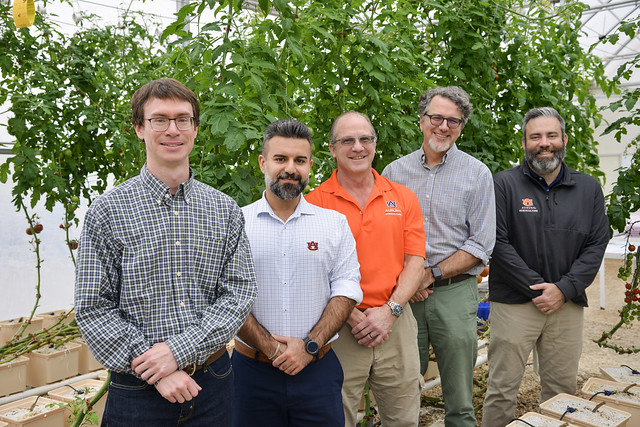Auburn University experts reimagine controlled environment agriculture
While controlled environment agriculture, or CEA, has the potential to improve access to local, nutritious fruits and vegetables on a year-round basis, the greenhouse gas emissions associated with greenhouse production is five times higher than field-grown produce.
For this reason, researchers at Auburn University are embarking on a wide-ranging and ambitious mission to reimagine CEA as a more sustainable approach to food production.
The project, titled “Reimagining Controlled Environment in a Low-Carbon World,” is the focus of a $9.95 million grant recently awarded to Auburn by the U.S. Department of Agriculture’s National Institute of Food and Agriculture’s Sustainable Agriculture Systems program.
“CEA must be reimagined to become a sustainable approach to food production,” said Brendan Higgins, associate professor in the College of Agriculture’s Department of Biosystems Engineering and project director.
“Our team’s long-term goal is to transform CEA strategically, managerially, technologically and socially to position it as a viable food production system capable of producing sufficient and nutritious foods within the low-carbon economy.”
“This award exemplifies the recognition of the significance and relevance of the CEA cutting-edge research that is being conducted by Dr. Higgins and his collaborators,” added Oladiran Fasina, department head and Alumni Professor for the College of Agriculture’s Department of Biosystems Engineering.
“The project will play a major part in transforming CEA to a viable food production system, especially since the expectation is that CEA will play a crucial role in addressing food security challenges that will arise as the world population increases to the projected more than 9 billion by 2050.”
The Auburn research team will engage in research, extension and educational activities that align with four overarching strategies to lower the carbon intensity of CEA: 1) Reduce demand for heating and cooling in CEA; 2) Improve efficiency of CEA climate control; 3) Lower the carbon intensity of resource inputs; and 4) Shift consumer and producer behavior surrounding CEA products and practices.
“Our team includes 19 investigators across five land-grant institutions who bring expertise in plant biology, horticulture, biosystems engineering, computer science and agricultural economics,” Higgins said.
The project focus is on greenhouse production of lettuce and tomatoes, given the large existing markets for these products and the large difference in their environmental needs.
“Our project is informed by an advisory board representing producers, a CEA equipment vendor and a dedicated project evaluator,” Higgins said. “The outcome of our efforts will be a climate-smart CEA production system that enables future generations to accrue the health benefits of fresh, local produce while sustaining local economies.”
Other Auburn researchers involved in the research include Sushil Adhikari, professor, biosystems engineering; David Blersch, associate professor, biosystems engineering; David Cline, associate extension professor, School of Fisheries and Aquatic Sciences; Hossein Jahromi, assistant research professor, biosystems engineering; Daniela Marghitu, Department of Computer Science and Software Engineering; Jeremy Pickens, assistant extension professor, Ornamental Horticulture Research Center; Neha Potnis, associate professor, Department of Entomology and Plant Pathology; and Daniel Wells, associate professor, Department of Horticulture.

